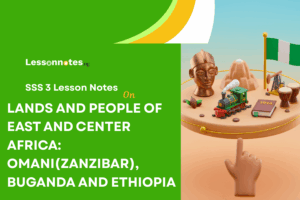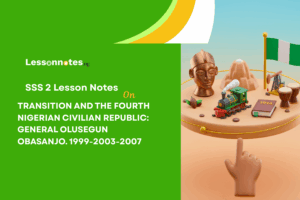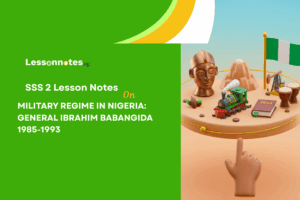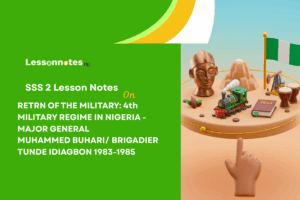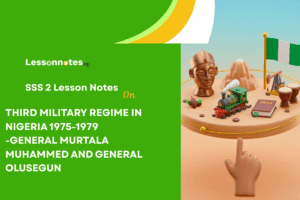7th Military Regime – Abdul Salam Abubakar (1998-1999) SS2 Nigerian History Lesson Note
Download Lesson NoteTopic: 7th Military Regime – Abdul Salam Abubakar (1998-1999)
After the sudden death of General Sani Abacha on June 8, 1998, Nigeria needed a new leader. General Abdulsalami Abubakar, who was the Chief of Defence Staff (the highest military position), became Nigeria’s new Head of State. Unlike previous military takeovers in Nigeria, this was a peaceful transition within the military following Abacha’s death from a heart attack.
General Abubakar was from Niger State in the northern part of Nigeria. He was a professional soldier who had received training both in Nigeria and abroad. When he took power, many Nigerians were tired of military rule and wanted democracy. The country was also facing serious economic problems and international isolation due to Abacha’s harsh rule.
The Situation Inherited
When Abubakar came to power, he faced many challenges left by the Abacha regime:
- Political Prisoners: Many pro-democracy activists and politicians were in jail, including Chief M.K.O. Abiola (who had won the annulled 1993 election).
- International Isolation: Many countries had placed sanctions (penalties) on Nigeria because of Abacha’s human rights abuses.
- Economic Crisis: The economy was in bad shape, with high inflation, unemployment, and poverty.
- Corruption: Government corruption was widespread, with billions of dollars stolen by Abacha and his associates.
- Ethnic Tensions: There were tensions between different ethnic groups, especially in the Niger Delta region.
- Military Dominance: The military had been in power for most of the previous 15 years, weakening democratic institutions.
Key Actions and Policies
Political Reforms
Abubakar quickly began to make changes to improve the political situation:
- Release of Political Prisoners: He freed many people who had been jailed by Abacha for political reasons.
- Transition Program: Within days of taking power, he announced a plan to hand over to civilian rule within one year.
- New Constitution: He set up a committee to review the 1995 draft constitution, leading to the 1999 Constitution.
- Electoral Commission: He created the Independent National Electoral Commission (INEC) to organize free elections.
- Political Parties: He allowed new political parties to form, leading to the registration of three parties:
- People’s Democratic Party (PDP)
- All People’s Party (APP)
- Alliance for Democracy (AD)
Abiola’s Death
One tragic event during this period was the death of Chief M.K.O. Abiola on July 7, 1998. Abiola had been in detention since 1994 for declaring himself president based on the June 12, 1993 election that he had won. He died of a heart attack just as he was about to be released, on the same day he was meeting with a U.S. delegation. His death led to riots in some parts of Nigeria, but Abubakar managed to calm the situation by promising to continue with the transition to civilian rule.
Economic Policies
Abubakar took steps to improve Nigeria’s struggling economy:
- Debt Relief: He began talks with international lenders to reduce Nigeria’s large foreign debt.
- Anti-Corruption Measures: He started efforts to recover money stolen by Abacha and his associates.
- Privatization: He continued the policy of selling government-owned companies to private investors.
- Salary Increases: Workers’ salaries were raised to help them cope with the high cost of living.
- Fuel Price Adjustments: He reduced the price of fuel, which had been raised under Abacha.
Foreign Policy
Abubakar worked to improve Nigeria’s standing in the world:
- Diplomatic Outreach: He sent representatives to other countries to explain Nigeria’s transition plan.
- Commonwealth Relations: He worked to bring Nigeria back into the Commonwealth, which had suspended Nigeria’s membership.
- United Nations: He addressed the UN General Assembly to explain Nigeria’s return to democracy.
- Regional Leadership: He maintained Nigeria’s peacekeeping role in West Africa through ECOMOG.
- Sanctions Removal: He successfully convinced many countries to lift sanctions against Nigeria.
Military Reforms
As a military leader overseeing a transition to civilian rule, Abubakar made changes to the military:
- Retirement of Officers: He retired military officers who had held political positions.
- Professionalism: He emphasized that the military should focus on defense, not politics.
- Restructuring: He reorganized the armed forces to make them more efficient.
- Civilian Control: He prepared the military to accept civilian leadership after the transition.
Niger Delta Issues
The Niger Delta region, where Nigeria’s oil is produced, had many problems during this period:
- Environmental Concerns: Oil production had damaged the environment, affecting fishing and farming.
- Resource Control: Local communities wanted more control over oil resources.
- Youth Restiveness: Many young people joined militant groups to protest against the government and oil companies.
- Development Initiatives: Abubakar started some projects to develop the region and reduce tensions.
The Transition to Civilian Rule
Abubakar kept his promise to hand over power to an elected civilian government:
- Local Government Elections: Held on December 5, 1998.
- State Elections: Held on January 9, 1999, for governors and state assemblies.
- National Assembly Elections: Held on February 20, 1999, for the Senate and House of Representatives.
- Presidential Election: Held on February 27, 1999, with Chief Olusegun Obasanjo (a former military ruler turned civilian) of the PDP defeating Chief Olu Falae of the APP/AD alliance.
- Handover: On May 29, 1999, Abubakar handed over power to Obasanjo, marking the beginning of Nigeria’s Fourth Republic.
The transition program was completed in less than one year, making it the shortest transition to civilian rule in Nigeria’s history.
Achievements of the Abubakar Regime
- Successful Transition: The main achievement was the quick and peaceful transition to civilian rule.
- Political Stability: Despite tensions after Abiola’s death, Abubakar maintained stability during a difficult period.
- International Rehabilitation: Nigeria’s image improved in the world under his leadership.
- Economic Stabilization: He took steps to address economic problems and reduce hardship.
- Press Freedom: Journalists could work more freely than under Abacha.
- Human Rights Improvement: Political prisoners were released, and human rights abuses decreased.
Criticisms and Challenges
- Abiola’s Death: The death of M.K.O. Abiola while in detention raised questions and suspicions.
- Short Transition: Some critics said the transition was too rushed and did not allow for enough preparation.
- Limited Consultation: The 1999 Constitution was not widely debated by the Nigerian people.
- Military Influence: The quick transition meant that the military still had significant influence over the new civilian government.
- Unresolved Issues: Problems like corruption, poverty, and ethnic tensions remained unsolved.
The 1999 Constitution
The 1999 Constitution, which is still in use today (with amendments), was a key legacy of the Abubakar regime. Key features include:
- Presidential System: A president who is both head of state and head of government.
- Federalism: Power shared between the federal government and 36 states.
- Separation of Powers: Government is divided into executive, legislative, and judicial branches.
- Fundamental Rights: Protection of basic human rights.
- Federal Character: Requirement that government appointments reflect Nigeria’s diversity.
However, the constitution has been criticised for being too centralised and for not being created through a truly democratic process.
Legacy
Abubakar’s brief rule had a lasting impact on Nigeria’s political development:
- Democratic Foundation: He laid the groundwork for Nigeria’s longest period of civilian rule since independence.
- Military Withdrawal: His regime marked the end of direct military involvement in Nigerian politics.
- Constitutional Framework: The 1999 Constitution he oversaw has shaped Nigeria’s political structure.
- Regional Standing: He restored Nigeria’s position as an important player in African affairs.
- Corruption Recovery: He began the process of recovering money stolen by previous regimes.
Comparison with Other Military Regimes
Abubakar’s regime differed from other military governments in Nigeria in several ways:
- Duration: At just 11 months, it was the shortest military regime in Nigeria’s history.
- Intent: From the beginning, it was clearly meant to be a transitional government.
- Human Rights: It had a better human rights record than most other military regimes.
- International Relations: It focused on improving Nigeria’s standing in the world.
- Democratic Commitment: It showed a genuine commitment to returning to civilian rule.
Conclusion
The 11-month rule of General Abdulsalami Abubakar is often seen as a positive chapter in Nigeria’s political history. Coming after the harsh rule of Abacha, Abubakar provided a peaceful transition to democratic governance. While his regime was too short to solve Nigeria’s deep-rooted problems, it set the country on a path toward democracy that has continued, despite challenges, for over two decades.
Abubakar’s willingness to hand over power voluntarily, and to do so quickly, earned him respect both within Nigeria and internationally. His regime showed that military officers could put the national interest above personal or institutional interests. This peaceful transition set an important precedent for the transfer of power in Nigeria.
The democratic system established during Abubakar’s transition was not perfect, and Nigeria has faced many challenges since 1999. However, the end of military rule opened the door for Nigerians to work toward building a more democratic, prosperous, and just society.






